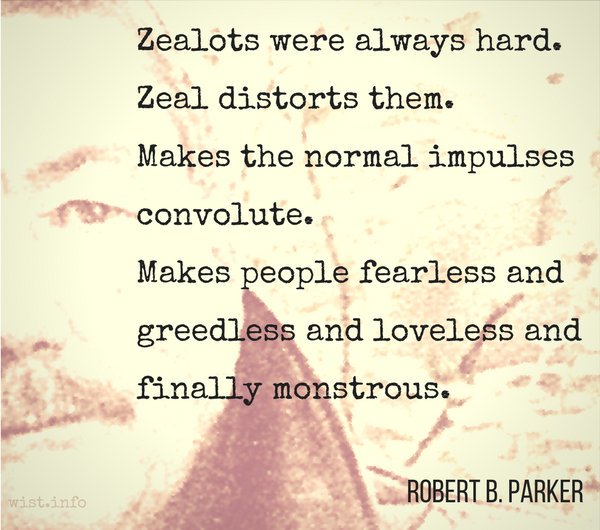Quotations by:
Parker, Robert
Candy smiled at me a little. “Look,” she said. “You’re a good guy. I know you care about me, but you’re a white male, you can’t understand a minority situation. It’s not your fault.”
[…] When the beer came, I drank about a quarter of it and said to Candy, “Extend that logic, and we eventually have to decide that no one can understand anyone. Maybe the matter of understanding has been overrated. Maybe I don’t have to understand your situation to sympathize with it, to help you alter it, to be on your side. I’ve never experienced starvation either, but I’m opposed to it. When I encounter it, I try to alleviate it. I sympathize with its victims. The question of whether I understand it doesn’t arise.”
She shook her head. “That’s different,” she said.
“Maybe it isn’t. Maybe civilization is possible, if at all, only because people can care about conditions they haven’t experienced. Maybe you need understanding like a fish needs a bicycle.”
“You’re quite thoughtful,” she said, “for a man your size.”
“You’ve never been my size,” I said. “You wouldn’t understand.”
As I left the building, classes were changing and the students were milling about in the halls. They seemed inconceivably young to me. Full of pretense, massively other oriented, ill formed, partial, angry, earnest, resentful, excited, frantic, depressed, hopeful, and scared.
Well, that’s my line of work. I go look at things and see what happens. If they were lying, maybe they will do some things because I went there today. Maybe they will make a mistake. The worst thing in any case is when nothing is happening. It’s like playing tennis: you just keep returning the ball until somebody makes a mistake. Then you see.
Then I went back to my hotel to think long thoughts. As is usual when I’m thinking long thoughts, I lay on the bed with my eyes closed. Susan says I often snore when thinking long thoughts.
“You ever fuck Susan here?” she said, her face almost touching mine.
“I’m impressed,” I said. “The question is intrusive, annoying, coarse, and voyeuristic. That’s quite a lot to get into a simple question.”
He took my seat and smiled again, like an affable crocodile. He was probably a very principled man, too. So were they all, all principled men. And women. There were few things more annoying than a visibly principled person. Or more troublesome. Most of the ones I’d met could have used a little uncertainty to dilute their principled-ness.
“John has warned me that you are a jokester. Well, I am not. If we are to have any kind of successful association, you’d best understand right now that I do not enjoy humor. Whether or not successful.”
“Okay if now and then I enjoy a wry, inward smile if struck by one of life’s vagaries?”
It had snowed in the night, and the world looked very clean, which I knew it not to be. But illusion is nice sometimes.
“I truly don’t know her issues,” Weiss said. “But I’ve been in this line of work for a number of years, and my guesses are at least informed by experience.”
“Never a bad thing,” I said.
“Experience can inform,” he said. “It can also distort.”
“Sure,” I said. “But inexperience is rarely useful.”
I hadn’t smoked in ten or twelve years, but I wished then I’d had a cigarette that I could have taken a final drag on and flipped still burning into the river as I turned and walked away. Not smoking gains in the area of lung cancer, but it loses badly in the realm of dramatic gestures.
“The best moments in my life,” I said, “have come because I loved somebody.”
“Yeah,” he said.
“And the worst,” I said.
“Yeah,” he said.
The waiter returned with Ronni’s bourbon. She drank it while he explained about the specials. The explanation took a while and I wondered, as I always did when people recited a menu at me, what I was supposed to do while they did it. To just sit and nod wisely made me feel like a talk show host. To get up and go to the men’s room seemed rude. Once in Chicago I had tried taking notes in the margin of the menu, but they got mad at me.
She smoothed her hair back from her forehead and looked at herself in the mirror. She looked like she always looked. It was probably a truth about tragedy, she thought, while the tragedy is going on people look pretty much the way they looked when it wasn’t.
“What’s the play about?”
“Nobody seems to know.”
“What do the actors say it’s about?”
“They don’t know,” Susan said. She was as close to embarrassed as she gets.
“The actors don’t know what it’s about?”
“No.”
“How about the Director?”
“Lou says that a play is not required to be about anything.”
“And it runs how long?”
“Four and a half hours with an intermission.” Susan smiled encouragingly. “It’s very controversial,” she said.
“Excellent,” I said. “Maybe a fight will break out.”


